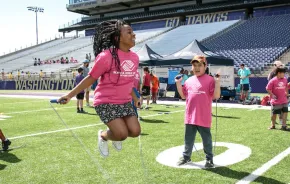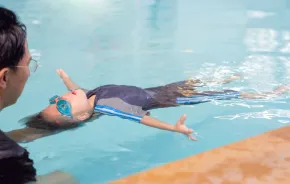Derek Edwards learned an important equation at an early age: work equals self-reliance equals opportunity.
Edwards, a 35-year-old Seattle resident, was 12 when he began mowing lawns in his Olympia neighborhood. He made $1,000 his first year. Later, after he got his driver's license, Edwards began hauling away junk and debris for people.
As far as his parents were concerned, Edwards could spend the money he earned however he wanted (though they did draw the line at allowing him to take scuba lessons when he was still only 12). "It definitely taught me that you can control your own destiny to be able to get what you want and do what you want," says Edwards.
What Edwards wanted to do -- and eventually did -- was start his own company, CallVision, which was bought by VeriSign, where he's now a vice president. Looking back, Edwards says the experience he gained working as a youngster -- knocking on people's doors, quoting prices, managing a bank account -- really helped him when he entered the adult work world.
Making the connection between work and success -- and between school and work -- are important lessons for pre-teens to learn, regardless of whether they ever start their own business, says David Moore, president of Junior Achievement of Washington. ''The most important business you'll ever manage is your life," he says.
George Dignan, administrator of the King County Work Training Program, says he's a "big fan" of exposing pre-teens to the world of work. "I do think we keep kids useless for way too long," he says. Having some sort of job enables kids to "feel what it's like to be useful... and to have a few bucks that are your own that you earned," Dignan says.
Child labor laws prohibit children under 14 from regular employment, but not from performing odd jobs such as lawn mowing, babysitting, walking dogs, washing cars or refereeing games. Taking on jobs at an early age teaches children many of the "soft skills" desired in the adult world, such as problem solving and working with people, says Moore. "There's also a big link between early work experience and graduating from high school," he says.
Junior Achievement gives fifth-graders a taste of the work world at Enterprise Village, a 15,000-square-foot facility in Auburn, where students spend a day working in a simulated bank, store, office and other businesses after writing a resume and going through an interview. Before the day-long visit, students complete an in-class curriculum on economic concepts. Afterward, students develop a plan for a business of their own and present their business plans to their class.
"A child that learns to responsibly deliver a product or service is going to do better in school, and they're going to understand the relationship between what they're learning in school and work," says Moore.
There are indications that children are not as prepared for the work world as they used to be or ought to be. The number of teens getting jobs has declined for the last four years, says Moore, and in 2003 the number of young adults filing personal bankruptcy exceeded the number graduating from college.
With about one-third of all high school graduates entering the work force within a year of graduating, it's important that they learn the essentials of getting and holding a job -- showing up on time, dressing appropriately, showing respect -- while still in school, says Moore. "You can teach that at 8, 9 or 10 years old," he says.
Parents can help their children understand that work is not -- at least in the figurative sense -- a four-letter word by paying attention to their interests and steering them into work experiences related to those interests. "Find a job you love and you'll never work a day in your life," says Moore.
It doesn't have to be a paying job. A child could organize a car wash and donate the money to a cause he or she is interested in, such as protecting the environment. "Not everybody is motivated by money," says Moore.
Or you child could volunteer as a way to gain work skills. "There are a lot of opportunities that give real-life experience that might not be a paid job," says Jessica Paul, Executive Director for Leadership Programs at the Metrocenter YMCA. The YMCA gives 11-14-year-old kids the chance to serve as volunteer counselors-in-training at camps and some branches, which can lead to paying jobs as teens.
If your child is ready to take that first job -- paid or not -- Paul says you should consider a few things. Make sure your child can keep up in school. Establish ground rules for saving versus spending. And make sure you and your child know something about their prospective employer.
Then, try to take a step back, and avoid reminders or admonishments about punctuality or performance, Paul says. "My own personal philosophy is they should come from the employer," said Paul. "Helping kids find something they want to do, but letting them own it, is important."
Brad Broberg is a freelance writer and former newspaper reporter/editor who lives in Federal Way with his 12-year-old daughter, Rachel.











